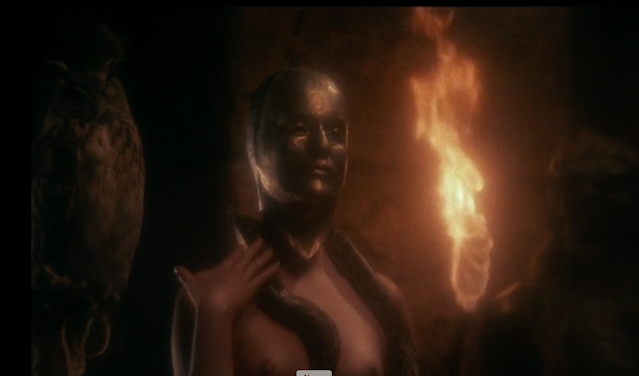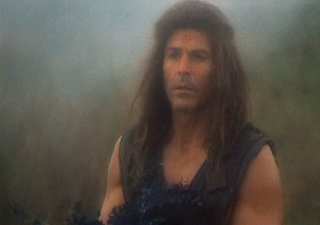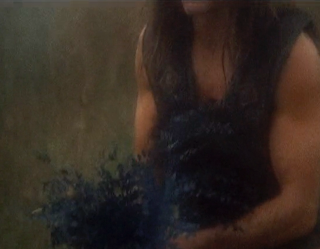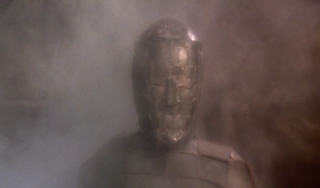 |
| "No one can rule the sun!" |
As DJ Stevie Wayne said, "there's something in the fog."
It's Day 11 of the 12 Nights of Ed Wood, a series I began back in October. but inexorably, it gets bogged, fogged, and waterlogged. But, there's so much to see - even when seeing the same things. Just like melting polar ice reveals strange prehistoric tundras on our Google Earth, so too does the ever-clearer and ever-sharper HD 2K-4K restoration of once pixelated, panned, scanned and streaky old bad movies reveal whole new vistas.
Of course, not everything is better for all the clarifying. This is especially true for a lot SFX that involve overlays, where a sharp outline around, say, giant ants or insects in Bert I. Gordon movies or Harryhausen movies where the background rear projection of the live actors in the background now look faded, browned and blurry by contrast to the crystal sharp monsters.. Sometimes the harsh clarity of 4D after the comforting fog of analog VHS, makes films look like Blanche Dubois suddenly exposed by the bright lights of a 2 AM closing time bar. The film needs the blur to hide its seams.
Luckily (?) no amount of HD sharpening can pierce the fog in the 1983 Lucio Fulci movie Conquest. It's fogged forever. Maybe its volcanic rocky surfaces are still cooling; its oceans still condensing from the steam clouds.
On the one hand, did they not check the film stock?
On the other, why not believe it's intentional and embrace it?
Watch it a few times and you gradually come to love the fog of Conquest. It lets the sun show as a big round disc, the rays from its setting and risng made tactile and many-colored. The light rays become a part of the frame composition, Fulci and his cinematographer use the sun, and its rays, especially at dawn and twilight, as part of the frame's composition. The sun is a featured character; the film even opens with the villain, evil sorceress Okron, coming up from her cave, flanked by tall wolf men and dudes in black masks. In her warbling echo-drenched evil voice and with uplifted arms, she does make it rise, or so she convinces her followers. Aside from her monsters, soldiers, whatever and demons she has around, down the mountain a bit there's a scattered throng of hippies (or the protean equivalent) sitting around, strung out on their furs and blankets, waiting for Okron like they're waiting for Hendrix at Woodstock.
With the sun and its rays such a prominent part of the mise-en-scene, Conquest becomes a big glowing, steaming fissure in the surface of the sword and sorcery genre. Genre traits and cliches creep out and/or tumble back in to be cooked and baked and boiled around it until the air is thick. Eventually all that's left is a sticky crust of dried blood, burnt fur, dead bats and bromance that survives beyond death. Not unlike the silhouette animation of Lotte Ellinger or some kind of primordial cave wall shadow puppet show, our unconscious projectionists eventually fills in the details the fog obscures. Like the cataract-eyed dead in Fulci's The Beyond, we may be unable to see reality, but we can see far deeper into something far darker. Meanwhile our convulsive four AM DT-addled mind just grooves on the absence of any detail that might derail our cozy disaffect. Even the gore has a kind of soothing poetry in the mist. Even primordial Tom Jones-style sexy meat eating, people being torn in half, or roasted on beds of coals, and ants crawling of out pus-dripping wounds, doesn't phase us out of our contented stupor. The ever-present fog makes such signs no more worrisome than a dream safely woken from with a clap of the hands or a pause button press.

Meanwhile, as our visual sense is impaired, our ears tune deeper in than normal to the soundtrack and are deeply, satisfyingly rewarded. Howls, squawks, distant animal grunts, whispered chanting, moans and murmurs. Claudio Simonetti's music churns up the mud with pulsing mellotron, an echo-drenched flanger and some gorgeous little synth moments. There's so little dialogue that when someone finally speaks it sounds odd, it's as if words have only recently been invented, like rivulets of inchoate coherence condensing from the fog of grunts and growling. With the soundtrack then just as rife with white noise as the pre-dawn imagery, what might be a wearying slog through blood and mud turns into the schlock cinematic equivalent of a really good bromide or hit of super-weed, especially if you watch it, as I like to do, while half-asleep, with good headphones on, and the setting or rising sun in blazing through your lidded eyes.

Naturally, good is up against evil in the plot: On the wise and 'good' side of the river, civilized but naive warrior youth Ilias (Andrea Occhipinti) is given a boat (looking suspiciously like a repurposed gondola prop) and a magic bow and arrow by his sophisticated peaceful villager elder (who, with his contingent, magically appear out of the mist). Ilias seems to be going on some kind of evil-fighting pre-Edenic
rumspringa. Almost as soon as his foot touches her side of the river, the mystical reverie of our brain-eating sorceress Ocron (Sabrina Siani), is soured by images of him and his bow and arrow. He may not know it yet, but he's coming for her! Writhing in post brain-eating ecstasy with her python on her black feather cape/boa (her metal head making her look a bit like Shanghai Lilly giving reverse-birth to an Oscar), she sees Ilias (without a face) drawing that magic bow and arrow at her. Finding and destroying him becomes her new obsession. Even the full head of a tasty, ripped-apart peasant girl can't allay her mounting dread over the wanderer with his glowing blue bow. Even while drugging it up in her Abel Ferrara-does-Thulsa Doom smoky cavernous orgy den, even after sending out her weird, wolf muppet Chewbacca-style raiders and their iron-masked associates to kill him (and get that bow) in wave after wave, she just can't shake his buzzkill psychic presence.
Even so, Ilias is gonna need help. Enter Mace, (Jorge Rivero) who wields a great nunchucks-bolo-sling shot combo-- bop bop bop. Mace will be the Xena to Ilias' Gabrielle, the Robin to his Batman, the Jake to his Heath (yes, I mean Brokeback Mountain, deal with it). And if you doubt: Mace can talk to the animals.
One of Fucli's secrets--one of the reasons his best films hold up so well to time and repeat viewings-- is his gift for paring out all the boring linear story-advancing subplots and details and 'suspense' crosscuts and character arcs that follow the hack auteur's idea of what a 'story' is all about and instead filling the
mise-en-scene with strange paranoid glances and foreshadowings that keep the viewer relentlessly off-kilter. He does this by presuming you're familiar with these fantasy worlds from other films, the influences he's borrowing from. We don't need to know why Mace can communicate with animals or how (because of
The we've seen
The Beastmaster --an influential hit in Italy). We don't need to know why Ilias is sent across the river or why he's so much more civilized than everyone else in this haunted land, because of
One Million BC. We don't need to understand Ocron's
raison d'etre because of Thulsa Doom in
Conan, and so on. The more movies we see, the fresher Fulci's counter-melodies seem as common cinematic signifiers and progression are subverted. We're never quite sure who is who, or why, or what's going to happen, if the hero will die before the end, if evil will legit triumph--it's all on the table. Connecting tissue like character backstory and cohesive
mise-en-scene are jettisoned in order to put the viewer in a mindset similar to tripping, being asleep, schizophrenic, or having a flu-boosted nightmare. If you need handrails to vault down the unlit cellar stairs into the primordial "total" abyss, maybe Fulci isn't for you. If you're ready to just jump, heedless of a fractured skull, down into the inky darkness because you're overjoyed to finally
not know what's going to happen next, if you're OK with not even knowing what's going on
now, if you can dig a movie where everything is wreathed in so much fog you have no idea who's doing what to whom, you're ready.
Usually, as per Deleuzian cinematic theory, film editing either operates on either the 'time-image' or 'movement-image' principle. In the movement image, we see the protagonist walking from, say across the street and into the bank, from a neutral vantage point, perhaps from the second floor of the building opposite; we see him open the door and walk inside. The next shot is inside the bank. In other words, the camera POV is neutral, a mere chronicler of action. In the time-image, the camera sees what the character sees. We see the door from his perspective; we may see a close-up of his hand turning the knob (if the filmmaker can afford inserts, or cutaways to people he sees looking at him suspiciously, etc. Of course most films use both, but use them to absorb the viewer--to the point we're unconscious of them --we don't even notice how they work on our psyche. But then crazy horror maestros like Fulci come along and use our familiarity with these methods to alienate rather than absorb, to slam our fingers in the window jamb of our structural cine-syntax and boom! A spike through the eyeball of the time-image.
Unless they know it's 'art' before going in, mot American critics presume their feeling of alienation from the narrative is the result of 'bad' filmmaking, but others 'get' the disruptive 'nightmare logic' at work in his weird editing / story approach. Suddenly instead of a familiar progression we're in a world of vivid kinetic action and reaction--nothing is certain. That's why a film like Conquest holds up so well to repeat viewings... we never really see the same movie twice, regardless of how many times we watch it, because its pattern never follows a recognizable trajectory. It keeps us in the moment, borrowing motifs from other films like signposts but then abstracting what they add up to, simplifying yet complicating the overall impression by a refreshing lack of morals and messages or cumulative logic.
Conquest gets a bad rap. The common consensus, even amongst Fulci devotees, is it's too foggy. Whatever. It deserves re-evaluation and all the fog would probably lend itself well to hallucinations if you see it on the right amount of the right drugs. I love it, just as much for what it lacks as what it has. I love how deftly it stays free of the detailed ponderous plotting that oft bogs these things down. There are no intro plot scrolls about days of olde; no ponderous voiceovers, duplicitous courtiers, parents, children, despotic generals, mustered extras, horses, dopey sidekicks, slapstick escapades, rollicking tavern fights, mickey mouse scoring, dungeon incarcerations, jugglers, rape, or extended macho torture sessions. A lot of people and monsters die but mostly it's just two dudes who like each other on a journey of amiable forward momentum, pausing every half a mile to bash a bunch of thugs and werewolves squarely on the sconce with a satisfying crunchy sound.

 We never learn what is in the straw Ocron and her posse pass from nostril to nostril, but the slow languid heavy way everyone moves makes us wish we had some.
Weirdest of all is the Brokeback Mountain vibe between Ilias and Mace. A groovy if deeply repressed homoerotic subtext thrives on close reading, depending on how much you want to feel around for it in the white-out fog. Hunky Mace (the 'top', Heath) believes some rivers are best left uncrossed ("your world is better than mine," he bemoans at one point, "but this is where I come from.") He's even too repressed to suck venom out of Ilias's leg wound, the way, say, latter soulmates like Xena and Gabrielle would do in nearly every episode (admittedly a decade later). Mace probably wouldn't even give him mouth-to-mouth if it was needed. Luckily its Mace who drowns, but then sputters to life after dolphins chew his ropes off after he's crucified (?!) and doesn't need it either. 'Whew!'
Still Mace is not afraid to pick his beau friend some healing lavender flowers when he's dying from a poisoned dart in his ankle (symbolism!). Look at Mace there (below) - gazing pensively around in the early morning mist while Ilias pines away in engorged agonies back on the riverside. As you see below, the mist adds an impressionistic, almost Matisse-esque lyricism to the image.
|



How times have changed! The closeted-even-to-itself sublimation of the Mace-Ilias bond seems quaintly timid today (in the 80s it would have drawn homophobic fury from its target audience) while the choice of making the most powerful woman in the film a naked, faceless monster is problematic in its faceless objectification. Good thing that the sort of critic who would dig deep enough to be offended by either era's reading will probably never take this fogbound journey into the unknown. Long hard to see (figuratively as well as literally), it's been remastered and made available online and in Blu-ray only because Fulci has such a fervent following. But even Fulci disowned it, walking away right after shooting. Hardcore Fulci apologists would rather champion something like The New York Ripper, wherein Fulci finally justifies his misogynistic accusers, than this murky execrcise. Legend has it Fulci was losing his health and his damned mind and this was the proof.

But what a run he'd had! Surely some of the classic Fulci magic had to spill over, even if no one saw it yet in that opaque fog on VHS. Now remastered and restored the fog has steam room magic all its own. And there are plenty of touches that make it unmistakably Fulci: the idea that he almost never films from the expected angle or distance. The camera is seldom at eye level; usually it's kept low so the boys loom as giants in the foreground with the magic hour sun behind their heads, or it swoops high up on a crane, as if some friendly giant beaming down at their foggy folly. The gore is always satisfying in its crunchiness. Callbacks to classic Fulci films abound: the way Ilias goes "yayayayayayaya" when batting away at the cave bats references Fulci's House by the Cemetery; the 'Eibon' symbol on Mace's forehead references Fulci's The Beyond; the gross close-ups of Ilias's venom and pus-engorged dart wound reference City of the Living Dead; the eerie center-screen-eyeless-head shot close-ups of the zombies resembles, you guessed it, Zombie. All in all, a Fulci capstone to a brilliant seven film / four year run.
It's not perfect. I do wish we got to see Siani's pretty face, and I wish we got an occasional break from the fog. But any old film can be in focus, and we can see Siani in Ator, the Fighting Eagle and Throne of Fire. Two movies that are like the PG-13 daytime and Conquest is the R-rated night.

I also find that, watching online, on Tubi or Youtubem with pop-up ads, is the perfect post-modern touch. Grubhub + half-asleep eyes + pareidolia fog + the Brooklyn accent of the voiceover artist doing Ilias's dub (the same guy who does Trash in
1990: The Bronx Warriors) + Chase Visa
+ the primordial synths + the
Clan of the Cave Bear make-up on the cute girl who lives just long enough to almost shag Ilias + SoClean for sleep apnea + someone getting ripped literally in half + the amazing cliff people emerging from their cliffside crevices, looking like cobwebbed Pillsbury snowmen and talking like Herve Villechaize.
Maybe that scene sums up the appeal, the way it reminds me of childhood bonds: "Where is your friend?" the monster asks a crucified Mace. "I have no friends," Mace says. "You lie!" the monster shouts back. It's so weird and basic and may evoke the realization that these guys are mentally ten years-old and making their first friend in school. Suddenly there he is: Ilias, he came back! As the moody Assault on Precinct 13-ish synth chords oscillate, he shouts up at his crucified friend "Mace, I've come back! I'm not afraid!" My fellow Conan-loving friend Alan and I would have loved this movie, had we not been such snobs about dubbing. We'd shout "I'm not afraid!" over and over at each other in key moments.
Prepared with rock bottom expectations, I loved it the first time I saw it, and I always will love it. I have been turning to it for sleep and stress relief ever since, to the point my girlfriend rolls her eyes when she hears some of those cycling Simonetti synth riffs. As B&S's Sam Panico says:
"Conquest is either the worst film you’ve ever watched or a batshit insane descent into mythical archetypes. There can be no middle ground." Studied through a jeweler's lens, it
may seem a cloudy piece of junk, but we of terrible vision know it's a rare jewel whose facets are best appreciated via indirect gazes, i.e. like a shadow person you can only see in reflections on your silverware. Resist the brain's attempt to memorize and overthink it through its mythic parade of the warmly familiar and the forever unknowable and, like a half of a Remeron chased with a smoke shop shot of kratom--the next best thing to being asleep. In his Fulci book
Beyond Terror, Stephen Thrower writes: "Half the fun of sleeping pills is in fighting the effects, staying awake to experience their weird pharmaceutical slurring: but few would want to feel that way while trying to crawl through a
Conan the Barbarian rip-off. " (183).
Count me as one of the few, the proud, the cataract-eyed crawlers.
Mace! I'm not afraid!
See also the Other 11 Nights of Wood, and Wood-esquery:













No comments:
Post a Comment